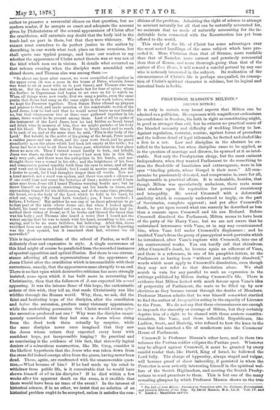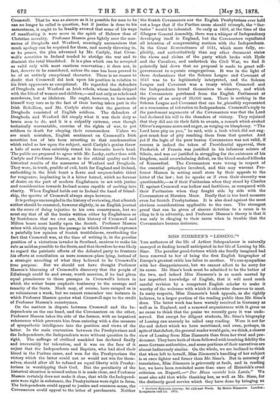PROFESSOR MASSON'S MILTON.*
[SECOND NOTICE.] .
IT is only in certain very broad aspects that Milton can be admired as a politician. lie expresses with magnificent enthusiasm his confidence in freedom, his faith in right as constituting might, in good as stronger than evil, but he evinces no practical sense of the blended necessity and difficulty of wedding liberty to law. Against regulation, restraint, routine, against forms of procedure and the tedious detail of legal tribunals, he fretted and chafed like a lion in a net. Law and discipline in the abstract he ex- tolled to the heavens, but when discipline came to be applied, as in the question of marriage and divorce, he spurned at it as intol- erable. Not only the Presbyterian clergy, but the most eminent Independents, when they wanted Parliament to do something to stem the flood-tide of fanaticism and extravagance, were in his eyes "hireling priests, whose Gospel is their maw." All com- promise he passionately detested, and compromise is, once for all, indispensable in practical affairs. It is undeniable, besides, that though Milton was speculatively audacious, there rests some faint shadow upon his reputation for personal consistency and intrepidity. lie served Cromwell with a deferential assiduity which is commonly understood to imply, on the part of Secretaries, complete approval ; and yet after Cromwell's death, he put upon record what can scarcely be described as less than a censure upon Cromwell and his son Richard. Before Cromwell dissolved the Parliament, Milton seems to have been of the party of Sir Harry Vane, but we are not aware that he maintained intercourse with Vane, or in any way countenanced him, when Vane fell under Cromwell's displeasure ; and he omitted Vane's from the group of panegyrical word-portraits which he introduced, after Vane's rupture with Cromwell, into one of his controversial works. You can hardly call that chivalrous. After Cromwell's death, he became again an adherent of Vane, and there is a reference, in one of his pamphlet-letters, to the Parliament as having been " without just authority dissolved," words which must apply to Cromwell's dissolution, even though they may not refer to that dissolution alone. We shall search in vain for any parallel to such an expression in the writings published by Milton during Cromwell's life. There is evidence that Milton looked with much favour upon Vane's idea of perpetuity of Parliament, the seats to be filled up by new elections as they became vacant through the deaths of Members. Professor Masson admits that he was himself somewhat startled to find the author of Areopagitica acting in the capacity of Licenser to the Press. We do not say that these circumstances are enough to impeach the sincerity or courage of Milton, but they certainly deprive him of a right to be classed with those austere constitu- tionalists, like Vane, and those inflexible Republicans, like Ludlow, Scott, and Haslerig, who refused to bow the knee to the man that had marched a file of musketeers into the Commons' House of Parliament.
Cromwell is Professor Masson's other hero, and in these two volumes the Puritan soldier eclipses the Puritan poet. Whatever may be alleged against Cromwell, it must be granted by every candid reader that, like David, King of Israel, ho followed the Lord fully. The charge of hypocrisy, always stupid and vulgar, will become proof of sheer imbecility, if persisted in when the Protector is seen ardently interesting himself in the spiritual wel- fare of the Scotch Highlanders, and moving the Scotch Presby- terians to send preachers to them. This is but one of the many revealing glimpses by which Professor Masson shows us the true
• The Life of John Hilton: Narrated in Connection with the Political, Heriesiaslica, and Literary History of his Time. By David Manion, M.A., LL.D. Vol,. IV. anA V. London: Macmillan and Co. Cromwell. That he was as sincere as it is possible for man to be can no longer be called in question, but if justice is done to his earnestness, it ought to be frankly avowed that some of his ways of manifesting it were more in the spirit of Hebrew than of Christian morality. Professor Masson goes lightly over the seas- sacres of Drogheda and Wexford, seemingly unconscious that much apology can be required for them, and merely throwing in, As he passes, the plea advanced by Mr. Carlyle, that Crom- well's severities in Ireland tended to abridge the war and to diminish the total bloodshed. It is a plea which can be accepted as valid only with most cautious reservation ; it does not, in fact, deserve to be considered, unless the case has been proved to be of an entirely exceptional character. There is no reason to doubt that Cromwell did look upon his position in relation to his Irish opponents as exceptional. He regarded the defenders of Drogheda and Wexford as Irish rebels, whose hands dripped with the blood of women and children,—and not only as rebels and murderers, but as idolaters. He ought, however, to have made himself very sure as to the fact of their having taken part in the Irish Rebellion, and Mr. Carlyle states that the garrison of Drogheda consisted of English soldiers. The defenders of Drogheda and Wexford did simply what it was their duty as brave men to do, and it is a culpably extreme, even though technically warrantable, exercise of the rights of war, to put soldiers to death for obeying their commanders. Unless we are much mistaken, English sentiment on Cromwell's Irish severities has of late been reverting to that condemnation which ruled as law upon the subject, until Carlyle's genius threw a halo of more than saintship round his favourite hero's bead. The public are prepared to agree with Mr. Lecky, rather than with Carlyle and Professor Masson, as to the ethical quality and the historical results of the massacres of Wexford and Drogheda. They were, in truth, prolific of evil, both for England and Ireland, embedding in the Irish heart a fierce and unquenchable thirst for vengeance, implanting in it a bitter hatred, which no fervour of desire on the part of modern Englishmen to act with justice and consideration towards Ireland seems capable of melting into charity. When England holds out to Ireland the hand of friend- ship, the spectre of Cromwell always steps between.
It is perhaps unexampled in the history of reviewing, that a Scotch author should be censured, however slightly, in an English journal on the score of doing injustice to his own countrymen, but we must say that of all the books written either by Englishmen or by Scotchmen that we ever saw, this history of Cromwell and Milton bears most hardly upon the Scotch. Professor Masson seizes with alacrity upon the passage in which Cromwell expresses a painfully low opinion of Scotch truthfulness, overlooking the fact that Cromwell was, at the time of writing it, in the peculiar position of a victorious invader in Scotland, anxious to make his rule as mild as possible to the Scots, and that therefore he was likely to regard the patriotic efforts of the defeated party to frustrate his efforts at conciliation as mere common-place lying, instead of a strategic unveiling of what they believed to be Cromwell's true purpose. But we should not have thought Professor Masson's blazoning of Cromwell's discovery that the people of Edinburgh could lie and swear, worth mention, if he had given equal prominence to those passages in Cromwell's letters in which the writer bears emphatic testimony to the courage and tenacity of the Scots. Much may, of course, have escaped us in so voluminous a work, but we cannot remember one instance in which Professor Masson quotes what Cromwell says to the credit of Professor Masson's countrymen.
On the matters in dispute between Cromwell and the In- dependents on the one band, and the Covenanters on the other, Professor Masson takes the side of the former, with an impatient vehemence which prevents him from entering with a due measure of sympathetic intelligence into the position and views of the latter. In the main contention between the Presbyterians and the Independents, the Independents were without question in the right. The suffrage of civilised mankind has declared finally and irreversibly for toleration, and it was on the face of it unjust that the Independents and Baptists, who had abed their blood in the Puritan cause, and won for the Presbyterians the victory which the latter could not or would not win for them- selves, should after all be refused an equal liberty with Presby- terians in worshipping their God. But the peculiarity of the historical situation is missed unless it is made clear, and Professor Masson certainly does not make it clear, that while the Independ- ents were right in substance, the Presbyterians were right in form. The Independents could appeal to justice and common-sense, the
Covenanters could appeal to the letter of parchments. Neither LOna°"1:1.4afghCriniZI'' his Life and Works. the Scotch Covenanters nor the English Presbyterians ever held out a hope that if the Puritan cause should triumph, the "Sec- taries " would be tolerated. So early as 1638, at the time of the Glasgow General Assembly, there was a whisper of Independency developing itself in England, but the Covenanters repudiated all intention of compromising matters with the Independents. In the Great Remonstrance of 1641, which more fully, ex- plicitly, and authoritatively than any other document states the views and claims of the party which broke with Hyde and the Cavaliers, and undertook the Civil War, we find it pointedly laid down that no proposal is made to grant self- government to separate congregations. It was in the light of these declarations that the Solemn League and Covenant of 1643 was to be legitimately interpreted, and the Solemn League and Covenant was a treaty which Cromwell and the Independents bound themselves to observe, and which the Covenanters purchased from the English Parliament at the price of an army of 20,000 men. There is nothing in the Solemn League and Covenant that can be .plausibly represented as a concession of toleration to Independents. Cromwell's reply to the parchment arguments of the Covenanters was that the Lord had declared his will in the thunders of victory. They rejoined that they did not tie their faith to events, a remark which evoked Oliver's supreme scorn and anger, as verging on blasphemy. "The Lord have pity on you," he said, with a look which did not sug- gest much fear of pity reaching them from that quarter. And yet if the logic of the poor beaten Covenanters was not valid, if success is indeed the token of Providential approval, then Frederick of Prussia was justified in his infamous seizure of Silesia, and was not justified in struggling for the existence of his kingdom, amid overwhelming defeat, on the blood-soaked hillocks of Kunersdorf. The Covenanters were wrong in respect of the essential principles involved, and this may warrant Pro- fessor Masson in setting small store by their appeals to the letter of the law ; but he speaks as if even their sincerity was questionable,—as if their Puritanism when they stood by Charles II. against Cromwell was hollow and factitious, as compared with their Puritanism when they fought side by side with the Covenanters at Marston Moor. Really that is too hard measure even for Scotch Presbyterians. It is also dead against the most obvious considerations applicable to the case. The strongest proof that can be given of sincere devotion to a cause is to cling to it in adversity, and Professor Masson's theory is that it was only in clinging to their cause when in trouble that the Covenanters became insincere.



































 Previous page
Previous page